Chesser Island, Okefenokee Swamp
Charlton Co., GA
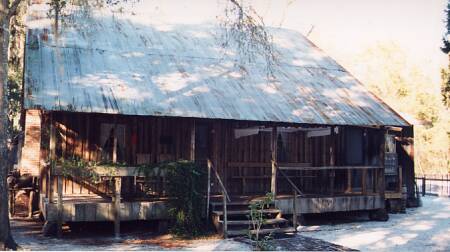 I,
Tara Fields, took the following pictures. Feel free to copy the pictures as
long as they are used for non-profit reasons and proper credit is given. All
indoor pictures were taken with no flash or any type of electrical light -
the only light source was what made it through the windows. I've attempted
to lighten them up somewhat. I,
Tara Fields, took the following pictures. Feel free to copy the pictures as
long as they are used for non-profit reasons and proper credit is given. All
indoor pictures were taken with no flash or any type of electrical light -
the only light source was what made it through the windows. I've attempted
to lighten them up somewhat.
Although we live only about an hour from the park we have not made this
trip very often; three times, I believe. We made this trip in the fall of
1996. The bugs were bad but the heat was tolerable. I think the bugs were
attracted to my bug spray...
The vast majority of the people living in this area were good, hardworking,
honest, god-fearing people. They loved, respected, and took pride in the
swamp for they knew it was special. Many attended the Primitive Baptist
Churches that dotted the area. Based on everything I have read and all the
people I have talked to, the people of the swamp were intelligent, wise
people. Contrary to some popular stereotypes, the people of the swamp were
NOT ignorant, barely civilized people. You see, if they were not intelligent
and wise, they would not have been able to survive in the Okefenokee.
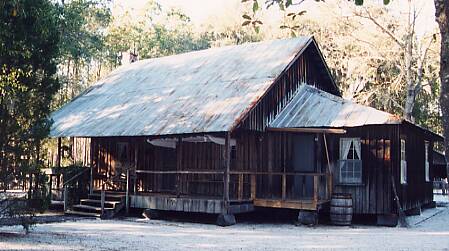
In the early 1900s, Francis Harper, a naturalist, began collecting
information on not only the swamp but mostly on the people who populated the
swamp. One of the families he spent time with was the Chessers. Since the
Chesser house that still stands on the island was built in the 1920's, chances
are he at least visited it. Information on Harper's book is listed at the
end of this page. I am not sure, but it could very well be the same one
whose pictures are included in the book. The island was deserted sometime
around the late 1940's. The Chessers were members of the Sardis Primitive
Baptist Church.
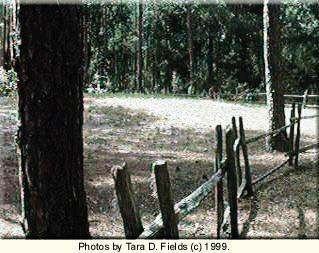 To
the side of the house is a large Indian Burial Mound. Apparently, this was
left by a race of Indians that came before the Seminoles. The Indians buried
in this area are said to be over 6 feet tall. It is hard to tell, but this
mound was at least 2-3 feet high. Locals tended to leave alone the mounds
that dotted the swamp. To
the side of the house is a large Indian Burial Mound. Apparently, this was
left by a race of Indians that came before the Seminoles. The Indians buried
in this area are said to be over 6 feet tall. It is hard to tell, but this
mound was at least 2-3 feet high. Locals tended to leave alone the mounds
that dotted the swamp.
Chesser Island was the home to the family of the same name for around a
century. Most people living in the swamp lived off hunting and/or fur
trading, making honey and syrup, raising animals, and farming. The families
of the swamp, including the Chessers, finally had to move off the island
when the Okefenokee became a refuge.
When you enter the house through the front door a bedroom lays to the
right and the living room is to the left. The living room was much to dark
to get a good picture.
Once through the living room is another bedroom on the left. I was able
to get a decent picture of part of it here.
While the parents had their own room, which may be shared from time-to-time
with a baby, the children generally shared rooms.
Outside, the bugs kept us moving quickly along! While the windows had
screens over them, there was some small spaces between the floor, wall, and
ceiling planks. However, I never noticed any bugs inside.
All indoor pictures were taken with no flash or any type of electrical
light - the only light source was what made it through the windows. I have
attempted to lighten them up somewhat.
|
 When
facing the front of the house, the porch is on the left side. You would
enter the porch from the kitchen. There is no indoor plumbing so bathing
was done in the bathtub on the screened in porch - notice the hand pump. When
facing the front of the house, the porch is on the left side. You would
enter the porch from the kitchen. There is no indoor plumbing so bathing
was done in the bathtub on the screened in porch - notice the hand pump. |
 This is the back of the house. To the very left is a bedroom, in the center is the kitchen (with the chimney), and to the right is the back porch. The house is in relatively good shape. All of the walls are unpainted. This is the back of the house. To the very left is a bedroom, in the center is the kitchen (with the chimney), and to the right is the back porch. The house is in relatively good shape. All of the walls are unpainted. |
 This little fella was sunning himself on the gate to the fence that surrounds the backyard. I didn't see many animals on the island. A few reptiles and some birds. While I'm sure there are probably still deer out there, they kept well away from the homestead! This little fella was sunning himself on the gate to the fence that surrounds the backyard. I didn't see many animals on the island. A few reptiles and some birds. While I'm sure there are probably still deer out there, they kept well away from the homestead! |
|
 This is the view from the back yard of the house. Inside this sugar cane shed it's dark but clean. Inside this building the
Chessers
would boil sugar cane to make sugar cane syrup. Every October
folks gather at the homestead to eat, drink, and make cane syrup! This is the view from the back yard of the house. Inside this sugar cane shed it's dark but clean. Inside this building the
Chessers
would boil sugar cane to make sugar cane syrup. Every October
folks gather at the homestead to eat, drink, and make cane syrup! |
 The cast-iron pot was used to make once-famous Chesser Island Sugar Cane Syrup. In the shed are other farming tools - long unused. The cast-iron pot was used to make once-famous Chesser Island Sugar Cane Syrup. In the shed are other farming tools - long unused.
|
 Both water pumps - the one in the house and the one in the shed, still work. Both water pumps - the one in the house and the one in the shed, still work. |
|
 After entering the backyard from the kitchen, there is a smokehouse on the right side of the
house. Meat was hung from the ceiling to cure. These outbuildings also held tools of all sorts and jarred goods. After entering the backyard from the kitchen, there is a smokehouse on the right side of the
house. Meat was hung from the ceiling to cure. These outbuildings also held tools of all sorts and jarred goods. |
 When
facing the back of the house this would be the right side. The back
porch (where the bathtub is) and the living room chimney are visible. The object to the right is a whetstone used to sharpen blades. When
facing the back of the house this would be the right side. The back
porch (where the bathtub is) and the living room chimney are visible. The object to the right is a whetstone used to sharpen blades.
|
 A
better picture of the stone - handsomely displayed by my one and only! A
better picture of the stone - handsomely displayed by my one and only! |
|
 This device is used to grind sugar cane. A pair of horses were attached to either end of the long, horizontal, pole. The turning causes the cane to be ground between stones.
Carl Mobley said that the barrel caught the juice. It was then boiled down into syrup. This device is used to grind sugar cane. A pair of horses were attached to either end of the long, horizontal, pole. The turning causes the cane to be ground between stones.
Carl Mobley said that the barrel caught the juice. It was then boiled down into syrup. |
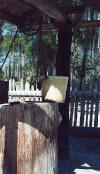
The hand-drawn well with pulley system. |

The hand-drawn well with pulley system. |
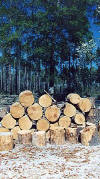 |
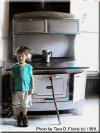 |
 |
 |
 |
 |
 |
 |
 |
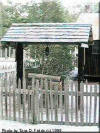 |
|
 |
|